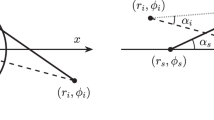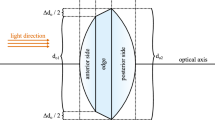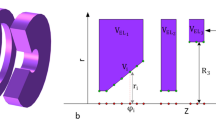Abstract
ALTHOUGH for magnetic electron lenses the field1  is known to permit rigorous calculation, this is not the case for electrostatic single lenses as used in electrostatic microscopes, for which up to now no type permitting exact calculation was known. We shall show in the following that the electrostatic counterpart to (1), namely:
is known to permit rigorous calculation, this is not the case for electrostatic single lenses as used in electrostatic microscopes, for which up to now no type permitting exact calculation was known. We shall show in the following that the electrostatic counterpart to (1), namely:  is also integrable. The differential equation of paraxial rays for this field, which approximates very well to the axial potential distribution of a three-aperture lens, can be transformed into an equation with constant coefficients. A magnetic field of the Glaser-type can be superposed. Inserting in
is also integrable. The differential equation of paraxial rays for this field, which approximates very well to the axial potential distribution of a three-aperture lens, can be transformed into an equation with constant coefficients. A magnetic field of the Glaser-type can be superposed. Inserting in  the new variables ν, θ:
the new variables ν, θ:  which is well known from the bell-shaped field (1), we get:
which is well known from the bell-shaped field (1), we get: 
This is a preview of subscription content, access via your institution
Access options
Subscribe to this journal
Receive 51 print issues and online access
$199.00 per year
only $3.90 per issue
Buy this article
- Purchase on Springer Link
- Instant access to full article PDF
Prices may be subject to local taxes which are calculated during checkout
Similar content being viewed by others
References
Glaser, W., Z. Phys., 117, 285 (1941).
Author information
Authors and Affiliations
Rights and permissions
About this article
Cite this article
SCHISKE, P. An Electrostatic Single Lens permitting Rigorous Calculation. Nature 171, 443–444 (1953). https://doi.org/10.1038/171443a0
Issue Date:
DOI: https://doi.org/10.1038/171443a0
Comments
By submitting a comment you agree to abide by our Terms and Community Guidelines. If you find something abusive or that does not comply with our terms or guidelines please flag it as inappropriate.



